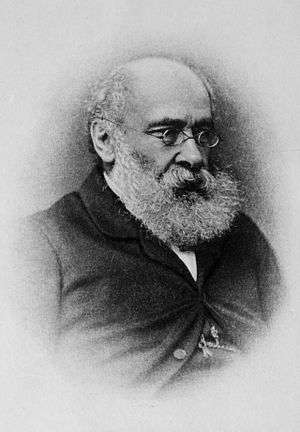Anthony Trollope

Anthony Trollope (1815 - 1882) was a prolific author. In a writing career of thirty-five years, he wrote forty-seven novels, seven non-fiction books, dozens of short stories, two plays, and an autobiography.
Trollope's narrative style is distinctive. He tells you what his characters do and say, what they are thinking, and what he thinks about what they are doing and thinking. Call it "third-person omniscient and chatty".
The typical Trollope novel is at least six hundred pages long and contains three or more plotlines. One plot is always a love plot. Within the first hundred pages, a young man and a young woman fall in love. But there's always something in the way. Sometimes the girl has a case of Wrong Guy First. Sometimes the boy has a previous engagement. Sometimes the couple has no money to live on. Sometimes there's a Parental Marriage Veto, perhaps caused by the lack of money. Don't worry; Trollope's love plots almost always have happy endings.
The other plots can be about anything; a perjury trial (Orley Farm), the collapse of a marriage (He Knew He Was Right), a clergyman accused of theft (The Last Chronicle of Barset), life in the British Civil Service (The Three Clerks), a massive stock swindle (The Way We Live Now), or British parliamentary politics (Phineas Finn, Phineas Redux, and The Prime Minister). These plots can have bittersweet or even downer endings.
- The Barchester Series
- The Warden
- Barchester Towers
- Doctor Thorne
- Framley Parsonage
- The Small House at Allington
- The Last Chronicle of Barset
- The Palliser Series
- Can You Forgive Her?
- Phineas Finn
- The Eustace Diamonds
- Phineas Redux
- The Prime Minister
- The Duke's Children
- Others
- He Knew He Was Right
- Is He Popenjoy?
- The Way We Live Now
- Orley Farm
- Autobiography
- All Girls Want Bad Boys
- Ambiguously Jewish - Melmotte, from The Way We Live Now, is the most notorious instance.
- Bittersweet Ending - Lady Anna. It's not at all clear that this marriage will be a pleasant one.
- Breaking the Fourth Wall - One of the hallmarks of Trollope's narrative voice.
- Celebrity Paradox
- Disposable Love Interest
- Fauxreigner
- Doorstopper: The best-known novels all come out at seven, eight, or nine hundred pages, although The Warden is an exception.
- In On Writing, Stephen King refers to Can You Forgive Her? as Can You Finish It?
- Grande Dame
- Gratuitous Greek
- Henpecked Husband - Bishop Proudie from the Barchester series.
- Her Heart Will Go On
- I Coulda Been a Contender - Archdeacon Grantly from the Barchester series, who fails to get his promotion to Bishop.
- Phineas Finn, from the Palliser novels Phineas Finn and Phineas Redux, is another example.
- It's the Same, Now It Sucks - In the Autobiography (ch. XV), Trollope explains that he did in Mrs. Proudie in The Last Chronicle of Barset after overhearing two men complaining about her in particular and the repetitiveness of his novels in general.
- Lemony Narrator
- Loads and Loads of Characters
- Love Dodecahedron
- Madness Mantra
- Meaningful Name - Although he doesn't have as many as Dickens, Trollope nevertheless comes up with a few notable examples, including Plantagenet Palliser (from the Palliser novels), Dr. Pessimist Anticant and Sir Abraham Haphazard (The Warden), Obadiah Slope (Barchester Towers), and the Proudies (from the Barchester novels).
- Mistaken for Cheating - He Knew He Was Right features a husband who becomes fixated on his wife's non-existent adultery.
- Money, Dear Boy - Trollope's Autobiography shocked many contemporary readers, thanks to Trollope's undisguised interest in earning good money for his fiction.
- New Era Speech
- No Celebrities Were Harmed - the Palliser novels include politicians modeled on Benjamin Disraeli and William Gladstone.
- Parental Marriage Veto - Several tries, at least, including Archdeacon Grantley's attempt to nix his son Henry's marriage to Josiah Crawley's daughter Grace (The Last Chronicle of Barset) and Plantagenet Palliser's nay-saying about the marriages of two of his children (The Duke's Children).
- Ripped from the Headlines - Is He Popenjoy?, based on the Tichborne Case (which dragged on so long that it was still in the courts when Trollope's final deadline arrived, leaving him to end the novel on an inconclusive note).
- Spin-Off - The Palliser series is spun off from the Barchester series.
- Stereotype Flip - Trollope's Jewish characters tend to be anti-Semitic stereotypes, but Mr. Brehgert in The Way We Live Now turns out to be one of the novel's most genuinely decent and honorable men.
- Two Lines, No Waiting - There are sometimes three, four, five, or more plots in his novels.
- Weddings for Everyone - Especially in The Way We Live Now, which has six marriages in the last fifty-odd pages.
- What Happened to the Mouse?
- Wife Husbandry
- Wrong Guy First